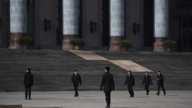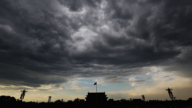【新唐人2012年11月27日訊】中共當局在2-30年間發展經濟的過程中,大陸的環境和資源,特別是水資源遭到極大的破壞,長期以來也不斷受到中外專家詬病。「十八大」之後,有輿論認為,習進平和李克強上任後,要做的事之一是解決中國的飲水問題。不過,有評論認為,已難以起死回生。下面就和專家一起來了解中國這道難解的問題。
上週五,美國「有線電視新聞網(CNN)」專欄「吉米的中國(Jaime’s China)」發表「習近平要做的事之一:解決中國的飲水問題」,再度挑起中國水資源問題的議論。作者Jaime A. FlorCruz與一群專家們討論了這個話題,大家都認為,中國的水危機看起來很嚴峻。中國水資源遭到極度浪費與生態的破壞問題,確實是極待即將上任的中國領導人解決的問題之一。
中國政治和社會觀察家戴晴則指出,過去30年間,中國的官員雖然嘴上也說,要愛護環境等等。但因為環境和資源的保護,永遠需要花錢而不會掙錢,更不會使GDP增長,在官員的任內不會有政績。戴晴說,實際上,並沒有人把環保真正當回事。而由於環境和資源所屬不明確,先下手、權力大者可以無償的去使用。
中國政治和社會觀察家戴晴:「只要中國的這個政治體制、經濟體制和民眾不能夠有效的監督當局,這個體制不變。那麼,受害的放在第一位的,永遠還是資源、還是環境。所以,那時候很多人對中國的政治改革、中國的未來,寄有很大的希望,我是非常悲觀的,就算十八大或者十九大上臺,但是,中國的環境和資源已經很難支持了。」
CNN的報導再次指出,中國快速的經濟增長是以環境作為代價。雖然,中共官員確實探討水資源問題。如,4月北京舉辦「中國水資源管理制度建設高級圓桌會議」。
但四川高級工程師,地質水利專家範曉分析,中國農業灌溉是以大水漫灌為主要方式,每畝地消耗水量很高;而大部分農業生產的主要地區,降雨量都是屬於濕潤和比較濕潤的地區,並不缺水。
地質水利專家範曉:「但是,我們對水資源的利用還是一種粗放的模式,按著這個粗放的模式去擴大灌溉面積,當然它會導致水資源的不夠用。現在中國工業、農業、居民生活用水的消耗指標都是很高的,高於世界的平均水準的。所以現在導致很多水資源短缺的現象,還是有人為原因造成的。」
另外,最近10幾年之間,中國城市急劇的擴張。范曉指出,包括大量的工業開發區,大量高耗水、高耗能的工業項目上馬。這個過程,已超出經濟本身正常發展。
范曉:「或者叫環境容量和水資源容量所允許的可能,一種不切實際的所謂的發展,是以環境為代價的。可能少數人會獲益,但是,對整個社會大多數人,它是不會帶來好的利益的。」
據報導,中共國家發展改革委副主任杜鷹也曾在文章中說,中國水資源短缺,用水效率不高,仍以傳統的「以需定供」方式謀求供需平衡,既不現實,也不符合經濟規律和科學發展觀的要求。
范曉指出,中國水資源的根本問題在於中共官員的思路和理念。他說,自1949年以來,中國在水利工程投入的財力和資金規模前所未有,但單純以工程手段任意調節支配水源,而不是利用有限的水資源、適應自然、發展有序的科學模式,在利益驅使之下,水資源當然無法滿足中共官員盲目無序的發展需求。
CCP’s New Leaders And China’s Damaged Water Resources
During the last 30 years of Chinese Communist Party (CCP)
authorities’ economic development,
China’s environment and resources, especially water
resources have been greatly damaged.
China has been criticized constantly for this.
After the CCP 18th Congress, it is estimated that one of the
key issues CCP’s new leaders Xi Jinping and Li Keqiang need to resolve is the quality of the drinking water.
However, there commentators think
this is a problem difficult to solve.
Last Friday, CNN’s column Jaime’s China published,
“One of the Things Xi Jinping Needs to Do Is to Solve
China’s Drinking Water Problem.”
It once again raised the issue of China’s drinking water.
Jaime A. FlorCruz and a group of experts discussed this topic.
They all believe China’s water crisis looks grim.
One of the problems the new leaders need to resolve is the
extreme waste of water resources and ecological destruction.
China’s political and social observer Dai Qing pointed out,
officials only talk about caring for the environment.
Environment protection only cost money, not make money,
nor increase GDP, thus officials don’t benefit from protecting the environment.
Dai Qing said in fact nobody takes environmental protection
truly seriously.
Due to the unclear definition of environment and resources,
whoever gets hold of power can use the resources for free.
Dai Qing: “As long as people cannot effectively supervise
China’s political system and economic system, the first victim is always resources and the environment.
I was very pessimistic when a lot of people had hopes
on China’s political reform and China’s future.
Though China might change after the 18th or 19th Congress,
it is very hard to keep China’s environment and resources.”
CNN’s report pointed that China’s rapid economic growth
is based on consumption of the environment.
CCP officials investigated water resource issues, such as
China’s Water Resources Management System Construction
High-Level Roundtable held in Beijing in April.
Sichuan senior engineer, geology and water conservancy
expert Fan Xiao analyses that China’s agricultural irrigation is mainly flood irrigation, so water consumption is high.
However, most of the major agricultural production areas
have an adequate rainfall.
Fan Xiao: “Our mode of water consumption is extensive.
To expand the irrigation areas using this mode
will of course lead to insufficient water resource.
Now China’ industrial, agricultural, living water consumption
indicators are very high, higher than the world average.
So there are human factors
causing shortage of water.”
In addition urban areas
expanded rapidly in the last 10 years.
Fan Xiao believes that launching many development zones,
high water consumption and high energy-consuming projects are already beyond normal economic development.
Fan Xiao: “There is an environmental capacity,
and a water capacity.
Unrealistic development is at the expense
of the environment.
It may be beneficial to a small number of people,
but not good to the majority of the people.”
Deputy director of CCP National Development and Reform
Commission, Du Ying, also mentioned this issue in his article.
While China suffers from water shortage,
China’s water usage efficiency is not high.
China still follows the model of “supply based on demand,”
which is neither realistic nor conforms to the economics laws or scientific concepts.
Fan Xiao pointed out that the fundamental issue of China’s
water resources is CCP officials’ ideas and concepts.
He said that since 1949, China had made unprecedented
amounts of investment in water conservancy projects.
But those projects were simply moving water resources
using engineering means,
rather than using limited water resources, adapting to nature,
and developing an orderly scientific model.
Driven by interests, water can’t meet the blind development
needs of the CCP officials.



























